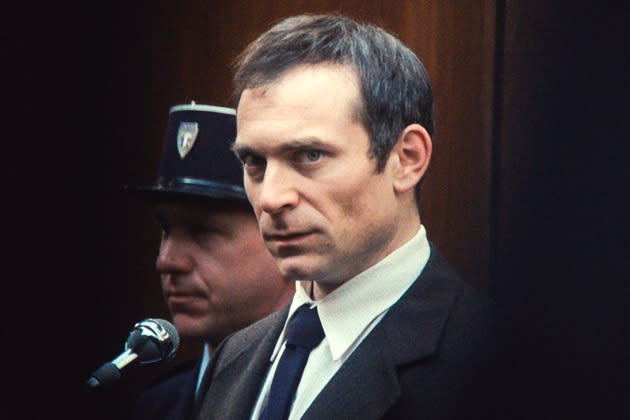‘The Goldman Case’ Review: A Stark, Gripping Courtroom Drama Tackling French Injustice
- Oops!Something went wrong.Please try again later.

Along with Alice Diop’s Saint Omer, which won Venice’s Silver Lion last year, and Justine Triet’s Anatomy of a Fall, premiering in Cannes’ main competition next week, Cédric Kahn’s The Goldman Case marks a recent trend of arthouse courtroom dramas that, beyond a few exceptions (such as Henri-George Clouzot’s seldom seen masterpiece, The Truth), have never been a major facet of French cinema.
This is because French trials, unlike American ones, tend to be less dramatic, with fewer rulings by jury (outside of murder cases) and with the judge playing a larger role in the proceedings, reviewing facts and statements in a dry manner. However, there have been a number of highly headline-grabbing trials in France these past years, including that of former President Nicolas Sarkozy for election fraud charges, and another concerning the November 13 terrorist attacks, which have brought the courtroom back into the public sphere.
More from The Hollywood Reporter
Like Diop’s excellent film, Kahn’s is based on a trial that actually happened. In fact, beyond an opening scene taking place in the office of the titular defendant’s lawyer, Maître Kiejman (Arthur Harari, director of Onoda: 10,000 Nights in the Jungle), the entirety of The Goldman Case is set inside a courtroom. This sounds like the backdrop for a play, and it makes for a verbose feature from a director whose previous films, such as Red Lights and The Prayer, were more visual and lyrical.
And yet The Goldman Case is not a regular stage drama, either. There is of course a certain level of suspense surrounding whether the defendant, Pierre Goldman (Arieh Worthalter), a leftist radical who committed several robberies and is accused of murdering two pharmacists, will be acquitted. And yet as the trial proceeds, it becomes fairly evident, at least to us, that the man is not guilty. The question is therefore whether the French state will actually let him off.
Set in 1975, at a time when crime was occasionally tied to left-wing radicalism in Europe (the Baader-Meinhof group, the Red Brigades) and the U.S. (the Weather Underground), the film presents Goldman’s ordeal less as a murder trial than a political trial of character. Kahn, who wrote the script with Nathalie Hertzberg, was inspired to make the movie after reading the defendant’s autobiography, Obscure Memories of a Polish Jew Born in France, which Goldman penned in prison and which turned him into a hero among the intelligentsia. His trial was attended by a swath of reporters, as well as by philosopher Régis Debray and actress Simone Signoret (played by lookalikes in the film), becoming a cause célèbre in the wake of May 1968 that pitted the government, especially the criminal justice system, against the left.
Throughout the movie, Kahn keeps returning to the prejudice of the French police, who fingered Goldman as the culprit in the pharmacy killings without any substantial proof. Their only major eyewitness is, in fact, an off-duty cop (Paul Jeanson), who was shot while the assailant was fleeing the scene of the crime, and who never manages to get his story straight. Another witness, a friend of Goldman’s hailing from the Antilles (Maxime Tshibangu), claims he was coerced by the police into testifying against him.
From the get-go, the vocal and volatile Goldman admits to committing various robberies but not to the murders, and he’s so self-assured that we believe him. Interrupting his lawyers, as well as the bigoted government prosecutor, Maître Garaud (Nicolas Briançon), he uses his trial as a platform to lash out against the police and state whenever he can. With a courtroom filled with leftist supporters, he turns the witness box into his own soapbox, decrying a country that remains racist, antisemitic and unjust.
Franco-Belgian actor Worthalter, who’s perhaps best known for his role in Lukas Dhont’s Girl, is riveting every time his character takes the stand. He convinces us of Goldman’s innocence, not to mention his commitment to political causes, far before the trial is over, and we’re only hoping that the jury will wind up agreeing with us. To back up the defendant’s testimony, we also hear from Goldman’s father (Jerzy Radziwilowicz), a Jewish war hero who gave his son an early education in resisting oppressors, prompting him to take up leftist activism later on, including a stint as a guerilla in Venezuela.
This isn’t to say Goldman has always been an upstanding citizen — he admits to being both a criminal and an alcoholic — but his honesty, including about the errors he’s made in the past, make up for his blatant shortcomings. It also helps that the defendant has such a passionate and poetic way of expressing himself aloud: “I’m innocent because I’m innocent,” he claims at one point, refusing to give further proof because doing so would be to comply with the injustice being committed against him.
Indeed, what links The Goldman Case to Saint Omer is its use of the courtroom drama to point the camera directly at French injustice itself. For Diop, it was about exploring her country’s latent racism, whereas for Kahn it’s about the anti-leftist and antisemitic leanings of the state in the 1970s — leanings that have found a new voice in today’s rise of the French radical right. “Jews and Blacks are the same,” explains Goldman in one of his many outbursts, and while that may seem like an overstatement, it brings up an unpleasant truth about discrimination in France that this powerful film bears witness to.
Best of The Hollywood Reporter
Natalie Portman at Cannes: "I Need to Leave the Drama for the Screen"
Ailing ‘Superman’ Star Valerie Perrine Finally Finds Her Hero: "The Guy Should Be Sainted"

